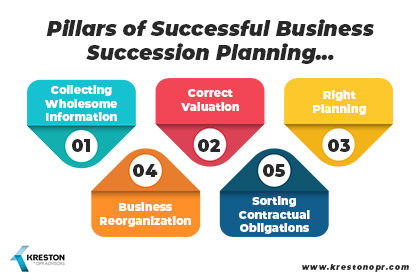
Family Businesses are run with a vision for the future and a commitment to the success of the business. In this, family businesses are not very different from any other organization.
But succession planning may not be as smooth for a family business as it is for others. Here’s a look at some challenges of succession planning and the pitfalls they lead to –
| CHALLENGES | PITFALLS |
| Procrastination It is easy to put off planning when everything is going well. This leads to procrastination. In fact, the best time to formulate a succession plan is when things are going well. |
Delayed Succession Planning
|
| Conflict Management In an environment where business decisions are influenced by family dynamics, conflicts are inevitable. This could be because of multiple family stakeholders with differing views, or because of the invested interests of non-family stakeholders. |
Weak Conflict Resolution Weakness in conflict resolution within a family business may challenge the survival of the business and the survival of the family. |
| Continuity Planning With each passing generations families grow along with the businesses. As more people with differing visions join the business, continuity planning gets more complex. And it may be harder to get everyone on board with one united vision for the future of the business. |
Differing Visions & Objectives Failing to unify the family to work towards one vision for the future can be fatal for a family business. This usually happens when there is a gap in understanding the needs of the next generation, or if they are not properly involved in the continuity planning. |
| Family Dynamics Succession planning in a family business touches upon delicate issues such as ownership, leadership, money, power, and recognition. This makes it imperative to set emotions aside and approach the succession with a practical mindset. |
Emotional Decisions Overlapping dynamics of family members in unique positions of the business may lead to emotional decisions for succession planning. |
Overcoming the pitfalls of poor succession planning is not necessarily a herculean task. Here’s a look at how you can avoid these difficulties to create an articulate succession plan which protects the interest of both, your business and your family.
- Start Early
One of the key aspects of succession planning is time. Planning ahead gives you the opportunity to consider your options for succession. Whether you find the right person internally or you choose to find external talent to lead your business; grooming and developing future leadership takes time.
- Recognize the Changing Dynamics
As a business leader, it is not enough to understand the dynamics among your own generation in the family business. Take the time to articulate the changing dynamics and the complexity of the relationships in the next generation as well. Hold open discussions about these differing thought processes, expectations and relationships to define what’s important to the family and the business in the future.
- Define Roles & Responsibilities
Defining the roles of the different family, and non-family members of your board in the succession planning process. This gives everyone a chance to voice their thoughts about the future of the family business. This is also provides you (the business leadership) the right support in this critical decision-making process.
- External Advice
Look outside your family and your business circle for external advice. Engage with other leaders of family businesses to understand how they are dealing with succession planning. Seek professional help and legal advice wherever necessary. This will help in getting a fresh perspective, free from family dynamics and emotions.
Succession Planning must seek to epitomize family values and the best interests of the business,to create a family constitution. These guiding principles can carry the business and the family successfully into the future. Passing on a business as your legacy to the next generation can be a reality. It needs proactive planning, good governance, and an acceptance for change as one generation steps down to allow the next to grow and prosper.

